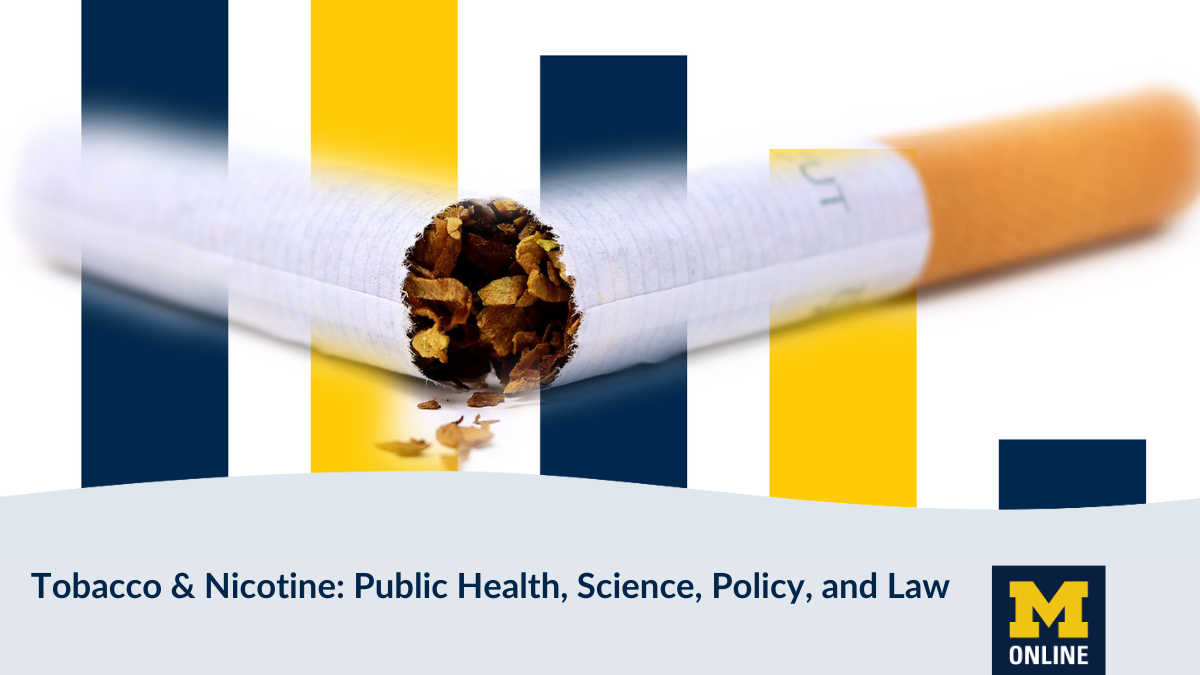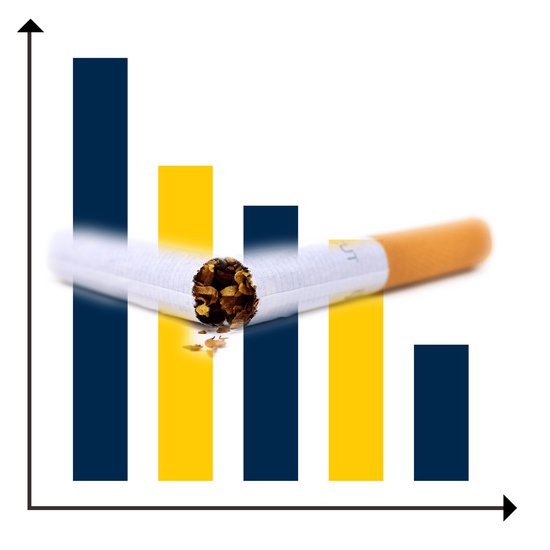
Experts in Tobacco Policy, Public Health Explore Most Effective Harm Reduction, Mitigation Efforts in Online Course
Charting the history of policy, best practices, and how to reach the "tobacco end game"
Sean Corp, Content Strategist
Through tremendous education, mitigation and control efforts, smoking in the United States has decreased significantly in the past 60 years. Still, cigarette smoking remains the leading cause of preventable death in the U.S. In 2021, 11.5% of U.S. adults, more than 28 million people, smoked cigarettes. At the same time, smoking by youth has plummeted to historic lows, but concerns persist regarding use of e-cigarettes by youth.
An online course from the University of Michigan, "Tobacco & Nicotine: Public Health, Science, Policy, and Law," explores the history of smoking in the U.S., the health effects of tobacco and other nicotine products, the tobacco industry's role in the epidemic, the ever-evolving policy landscape, and emerging efforts around the world related to tobacco harm reduction as a complement to traditional tobacco control measures.
The course features a mix of lectures and interviews with prominent experts and leaders in the field of tobacco control, and a closing panel discussion with authorities on the topic of the “tobacco endgame.” Many people featured in the course have dedicated their careers to fighting the smoking epidemic, including leaders in academia, government, law, scientific research and more. Cliff Douglas, director of the University of Michigan Tobacco Research Network and an adjunct professor in the School of Public Health, guides learners throughout the course.
Douglas has worked on tobacco-related issues since 1988, as an educator, lawyer, policy advisor and co-investigator of the Food and Drug Administration-supported Center for the Assessment of Tobacco Regulations (CAsToR), a collaboration of U-M and Georgetown University that provided support for the development of the course in collaboration with U-M’s Center for Academic Innovation.
CAsToR aims to provide evidence-based and expert-informed modeling of the behavioral and public health impacts of tobacco regulations. Within the course, leading experts from CAsToR’s research team, along with others, explore policy responses, emerging trends and best practices to more effectively and rapidly reduce the harm caused by tobacco use.
"It's clear … that traditional evidence-based programs and policies at all levels of government have made a major difference, cumulatively saving more than 10 million lives," says Douglas, citing the 2020 Surgeon General's report. He also notes the priority of expanding policy approaches to address new opportunities and challenges posed by the evolution of the tobacco product marketplace.
While much progress has been made since the U.S. Surgeon General released the first report on smoking and health in 1964, there is still much work to do to achieve the tobacco endgame, or even to agree on precisely what the endgame should aim for. Still, there is broad agreement on the public health imperative to end the epidemic of smoking-caused disease in the U.S. and globally.
The Surgeon General also encourages researchers and advisers in government and advocacy to remain diligent because the landscape is constantly changing, and Douglas says researchers must heed that advice.
"The profound and dynamic history of tobacco control over more than 50 years suggests that continued innovation is a key tenet of success. Therefore, the public health community must remain nimble and capable of evolving as quickly as the rapidly changing landscape of tobacco products," Douglas says.
Douglas hopes that by understanding the history of tobacco use and harm-reduction strategies, the evolving policy landscape, and current trends, those committed to fighting the smoking epidemic can identify innovative solutions to make the endgame a reality.

Tobacco & Nicotine: Public Health, Science, Policy, and Law
This course provides a strong foundation in the history of smoking and other tobacco and nicotine use; the individual and public health impact; tobacco use prevalence trends…
